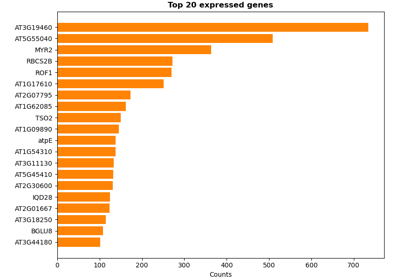biotite.sequence.align.RandomPermutation¶
- class biotite.sequence.align.RandomPermutation[source]¶
Bases:
PermutationProvide a pseudo-randomized order for k-mers.
Notes
This class uses a simple full-period linear congruential generator (LCG) to provide pseudo-randomized values:
\[\text{order} = (a c_\text{k-mer} + 1) \mod 2^64.\]The factor \(a\) is taken from 1 to ensure full periodicity and good random behavior. However, note that LCGs in general do not provide perfect random behavior, but only good-enough values for this purpose.
References
- 1
G. Steele, S. Vigna, “Computationally easy, spectrally good multipliers for congruential pseudorandom number generators,” arXiv, September 2021. doi: 10.48550/arXiv.2001.05304
Examples
>>> kmer_alph = KmerAlphabet(NucleotideSequence.alphabet_unamb, k=2) >>> permutation = RandomPermutation() >>> # k-mer codes representing the k-mers from 'AA' to 'TT' >>> # in lexicographic order >>> kmer_codes = np.arange(len(kmer_alph)) >>> print(kmer_codes) [ 0 1 2 3 4 5 6 7 8 9 10 11 12 13 14 15] >>> print(["".join(kmer_alph.decode(c)) for c in kmer_codes]) ['AA', 'AC', 'AG', 'AT', 'CA', 'CC', 'CG', 'CT', 'GA', 'GC', 'GG', 'GT', 'TA', 'TC', 'TG', 'TT'] >>> # Shuffle order of these k-mer codes using the permutation >>> order = permutation.permute(kmer_codes) >>> print(order) [ 1 -3372029247567499370 -6744058495134998741 8330656331007053504 4958627083439554133 1586597835872054762 -1785431411695444609 -5157460659262943980 -8529489906830443351 6545224919311608894 3173195671744109523 -198833575823389848 -3570862823390889219 -6942892070958388590 8131822755183663655 4759793507616164284] >>> # The order is not lexicographic anymore >>> kmer_codes = kmer_codes[np.argsort(order)] >>> print(["".join(kmer_alph.decode(c)) for c in kmer_codes]) ['GA', 'TC', 'AG', 'CT', 'TA', 'AC', 'CG', 'GT', 'AA', 'CC', 'GG', 'TT', 'CA', 'GC', 'TG', 'AT']
- Attributes
- min, max: int
The minimum and maximum value, the permutated value (i.e. the return value of
permute()) can take.
- permute(kmers)¶
Give the given k-mers a new order.
- Parameters
- kmersndarray, dtype=np.int64
The k-mers to reorder given as k-mer code.
- Returns
- orderndarray, dtype=np.int64
The sort key for the new order, i.e. a k-mer
Ais smaller than k-merB, iforder[A] < order[B]The order value may not only contain positive but also negative integers. The order is unambiguous: IfA != B, thenorder[A] != order[B].


